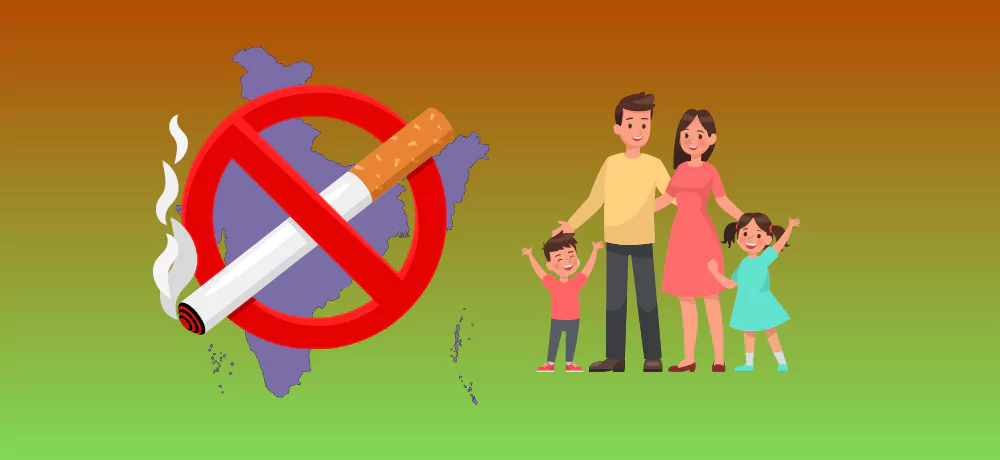
Smoke-Free India: The Role of Family and CommunityIndia faces a critical challenge in the fight against smoking, with millions still affected by the harmful habit. Smoking not only impacts individual health but also exerts a detrimental effect on families and communities.
Nation’s goal to become a smoke-free India goes beyond just making rules and regulations. It needs a united effort from families and communities, which are the core of our society.
Families play a crucial role because children learn from their surroundings from a very young age. A home where smoking is not allowed sets a strong example, helping to shape future generations who don’t smoke. Supporting communities also help by creating a social norm against smoking, offering encouragement to those who are trying to quit smoking.
Read this blog carefully and let’s see how families and communities can lead the way in making India smoke-free.
What is the Effect of Smoking on Family and Community?
Smoking carries severe consequences for both smokers and those around them. For families, the effects are particularly alarming. Smoking-related illnesses are linked to numerous health issues, including lung cancer, heart disease and respiratory problems.
According to the American Cancer Society, smoking causes approximately 87% of lung cancer deaths and increases the risk of other cancers and respiratory conditions.
Children in smoking households are especially vulnerable. Exposure to secondhand smoke can lead to a range of health issues, from frequent respiratory infections to developmental issues. The NHS highlights that passive smoking in children increases the risk of asthma and other serious illnesses.
The impact extends beyond health. Smoking also affects family dynamics and community well-being. Smokers may face social isolation, strained relationships, and diminished quality of life. The broader community suffers from increased healthcare costs and environmental damage. Cigarette production contributes to pollution, deforestation and climate change.
How Can Family Help with Quit Smoking?
Family support plays a crucial role in helping individuals quit smoking. Positive reinforcement and emotional support can significantly impact a smoker’s journey to quit. Here are some effective ways families can help:
Encouragement and Understanding:
Offering words of encouragement and showing empathy can boost a smoker’s confidence. Understanding the challenges of quitting smoking and celebrating small victories together fosters a supportive environment.
Creating a Smoke-free India:
Eliminating smoking triggers at home can make it easier for smokers to quit cigarettes and other tobacco products. Families should agree to maintain a smoke-free home and vehicle. This not only protects family members from secondhand smoke but also helps reinforce the smoker’s commitment to quitting smoking.
Education and Resources:
Providing information on the health risks of smoking and available quitting resources can be empowering. Resources such as support groups, quitlines and cessation programs can offer professional guidance and motivation.
Healthy Alternatives:
Encouraging healthier habits and activities can distract smokers from cravings. Families can engage in activities such as exercise, hobbies and cooking healthy meals together, making the quitting smoking process more enjoyable.
Expert Help:
Sometimes, professional intervention is required. Families can help in quitting smoking by encouraging smokers to seek counseling or join smoking cessation programs. Expert support can provide tailored strategies and medical assistance to enhance the likelihood of success.
How Will You Protect Your Family from the Dangers of Smoking?
Protecting your family from the dangers of smoking involves proactive measures and lifestyle changes:
Eliminate Smoking Indoors:
The only way to fully protect your family from secondhand smoke is to avoid smoking indoors or in the car. The NHS emphasizes that secondhand smoke can linger in enclosed spaces and harm non-smokers, especially children.
Educate Family Members:
Informing family members about the health risks associated with smoking and secondhand smoke can foster a collective commitment to a smoke-free lifestyle. Educating children about the dangers of smoking can prevent them from picking up the habit in the future.
Advocate for Smoke-Free Policies:
Support and advocate for smoke-free policies in your community. Encourage local businesses, parks, and public areas to adopt smoke-free environments to reduce exposure to harmful smoke.
Promote Quitting Resources:
Share resources and support systems with family members who are trying to quit smoking. This can include access to online quitlines, counseling services, and informational websites.
What is the Best Solution to Smoke-Free India?
Quitting smoking is challenging, but several effective strategies can help individuals overcome their addiction:
Set a Quit Date:
Establishing a specific quit date provides a clear goal and timeframe for cessation. Prepare for this date by removing cigarettes and smoking-related items from your environment.
Seek Professional Support:
Consulting a healthcare provider can provide personalized advice and treatment options. Medications such as nicotine free treatment and prescription medications like Bupropion and Varenicline can aid in managing cravings and withdrawal symptoms.
Join Support Groups:
Engaging with support groups and quitlines offers encouragement and accountability. Connecting with others who are also quitting can provide motivation and practical tips for managing challenges.
Adopt Healthy Habits:
Incorporate healthy activities into your daily routine to distract from cravings and reduce stress. Exercise, mindfulness practices, and healthy eating can improve overall well-being and support smoking cessation.
Stay Persistent:
Understand that quitting smoking may involve setbacks. Persistence and a positive attitude are crucial for overcoming challenges. Celebrate progress and seek support when needed.
Conclusion
A smoke-free India requires the collective effort of families and communities. By understanding the impact of smoking, offering support, and implementing effective strategies, we can create a healthier environment for ourselves and future generations. Families play a vital role in this endeavor, and their involvement is essential for fostering a smoke-free culture.
Let us unite in our efforts to support smokers, protect our loved ones, and build a healthier, smoke-free India.
India faces a critical challenge in the fight against smoking, with millions still affected by the harmful habit. Smoking not only impacts individual health but also exerts a detrimental effect on families and communities.
Nation’s goal to become a smoke-free India goes beyond just making rules and regulations. It needs a united effort from families and communities, which are the core of our society.
Families play a crucial role because children learn from their surroundings from a very young age. A home where smoking is not allowed sets a strong example, helping to shape future generations who don’t smoke. Supporting communities also help by creating a social norm against smoking, offering encouragement to those who are trying to quit smoking.
Read this blog carefully and let’s see how families and communities can lead the way in making India smoke-free.
What is the Effect of Smoking on Family and Community?
Smoking carries severe consequences for both smokers and those around them. For families, the effects are particularly alarming. Smoking-related illnesses are linked to numerous health issues, including lung cancer, heart disease and respiratory problems.
According to the American Cancer Society, smoking causes approximately 87% of lung cancer deaths and increases the risk of other cancers and respiratory conditions.
Children in smoking households are especially vulnerable. Exposure to secondhand smoke can lead to a range of health issues, from frequent respiratory infections to developmental issues. The NHS highlights that passive smoking in children increases the risk of asthma and other serious illnesses.
The impact extends beyond health. Smoking also affects family dynamics and community well-being. Smokers may face social isolation, strained relationships, and diminished quality of life. The broader community suffers from increased healthcare costs and environmental damage. Cigarette production contributes to pollution, deforestation and climate change.
How Can Family Help with Quit Smoking?
Family support plays a crucial role in helping individuals quit smoking. Positive reinforcement and emotional support can significantly impact a smoker’s journey to quit. Here are some effective ways families can help:
Encouragement and Understanding:
Offering words of encouragement and showing empathy can boost a smoker’s confidence. Understanding the challenges of quitting smoking and celebrating small victories together fosters a supportive environment.
Creating a Smoke-free India:
Eliminating smoking triggers at home can make it easier for smokers to quit cigarettes and other tobacco products. Families should agree to maintain a smoke-free home and vehicle. This not only protects family members from secondhand smoke but also helps reinforce the smoker’s commitment to quitting smoking.
Education and Resources:
Providing information on the health risks of smoking and available quitting resources can be empowering. Resources such as support groups, quitlines and cessation programs can offer professional guidance and motivation.
Healthy Alternatives:
Encouraging healthier habits and activities can distract smokers from cravings. Families can engage in activities such as exercise, hobbies and cooking healthy meals together, making the quitting smoking process more enjoyable.
Expert Help:
Sometimes, professional intervention is required. Families can help in quitting smoking by encouraging smokers to seek counseling or join smoking cessation programs. Expert support can provide tailored strategies and medical assistance to enhance the likelihood of success.
How Will You Protect Your Family from the Dangers of Smoking?
Protecting your family from the dangers of smoking involves proactive measures and lifestyle changes:
Eliminate Smoking Indoors:
The only way to fully protect your family from secondhand smoke is to avoid smoking indoors or in the car. The NHS emphasizes that secondhand smoke can linger in enclosed spaces and harm non-smokers, especially children.
Educate Family Members:
Informing family members about the health risks associated with smoking and secondhand smoke can foster a collective commitment to a smoke-free lifestyle. Educating children about the dangers of smoking can prevent them from picking up the habit in the future.
Advocate for Smoke-Free Policies:
Support and advocate for smoke-free policies in your community. Encourage local businesses, parks, and public areas to adopt smoke-free environments to reduce exposure to harmful smoke.
Promote Quitting Resources:
Share resources and support systems with family members who are trying to quit smoking. This can include access to online quitlines, counseling services, and informational websites.
What is the Best Solution to Smoke-Free India?
Quitting smoking is challenging, but several effective strategies can help individuals overcome their addiction:
Set a Quit Date:
Establishing a specific quit date provides a clear goal and timeframe for cessation. Prepare for this date by removing cigarettes and smoking-related items from your environment.
Seek Professional Support:
Consulting a healthcare provider can provide personalized advice and treatment options. Medications such as nicotine free treatment and prescription medications like Bupropion and Varenicline can aid in managing cravings and withdrawal symptoms.
Join Support Groups:
Engaging with support groups and quitlines offers encouragement and accountability. Connecting with others who are also quitting can provide motivation and practical tips for managing challenges.
Adopt Healthy Habits:
Incorporate healthy activities into your daily routine to distract from cravings and reduce stress. Exercise, mindfulness practices, and healthy eating can improve overall well-being and support smoking cessation.
Stay Persistent:
Understand that quitting smoking may involve setbacks. Persistence and a positive attitude are crucial for overcoming challenges. Celebrate progress and seek support when needed.
Conclusion
A smoke-free India requires the collective effort of families and communities. By understanding the impact of smoking, offering support, and implementing effective strategies, we can create a healthier environment for ourselves and future generations. Families play a vital role in this endeavor, and their involvement is essential for fostering a smoke-free culture.
Let us unite in our efforts to support smokers, protect our loved ones, and build a healthier, smoke-free India.
